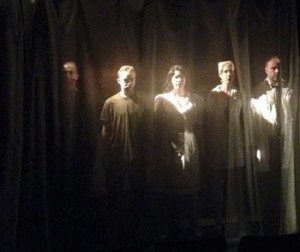
 When it comes to Elena Zucker’s dark absurdist play “O Walter, My Walter”, timing is everything. In light of the recent Veteran Affairs scandal, a play inspired by the uncovering of Walter Reed Army Medical Center’s criminal neglect of its veteran patients in 2007 fits the bill in a way that’s sobering and necessary. The fact that Zucker’s show opened on Memorial Day Weekend is less coincidental than driving home a point: despite the comedy, there are heavier issues being addressed here.
When it comes to Elena Zucker’s dark absurdist play “O Walter, My Walter”, timing is everything. In light of the recent Veteran Affairs scandal, a play inspired by the uncovering of Walter Reed Army Medical Center’s criminal neglect of its veteran patients in 2007 fits the bill in a way that’s sobering and necessary. The fact that Zucker’s show opened on Memorial Day Weekend is less coincidental than driving home a point: despite the comedy, there are heavier issues being addressed here.
With a cast of nine actors, six of whom go by the name of Walter during the play, Zucker accomplishes something brilliantly complex in its simplicity. With each utterance of that name, we’re reminded what and who the play is about. In addition to linking the play to Walter Reed Army Medical Center, the name Walter binds all six characters under a collective narrative. From Richard Crawford’s bumbling, embezzling Dr. Walter, to Andrew Baldwin’s masterful portrayal of a post-traumatic veteran Walter from the West Virginia, we can’t deny that they’re all ‘Walter.’ They all represent the complexity of veteran life in America.
This isn’t to say that “O Walter, My Walter” is without more than its fair share of campiness and spitfire wordplay. Jenny Lee Mitchell, Mischa Ipp and Vicki Oceguera brilliantly capture this comedic tone, all with their own unique physicality and mannerisms. Timur Kocak’s Government Investigator Walter also lends a hand in comedy, pulling from 1970s news anchor rigidity to make a wonderful straight man to Mitchell and Ipp’s foils.
 However, Zucker doesn’t give in to the temptation of being too light. The play chooses its moments to slowly crumble into darker territory, harkened by a surprising and chilling moment from Michael Villastrigo’s Catatonic Veteran Walter. Like the lighting around him, the mood gets unworldly dark. Adding to the fray is William Webber’s Veteran Walter, whose trauma, like that of Baldwin’s Southern Walter and many other veterans, is psychological.
However, Zucker doesn’t give in to the temptation of being too light. The play chooses its moments to slowly crumble into darker territory, harkened by a surprising and chilling moment from Michael Villastrigo’s Catatonic Veteran Walter. Like the lighting around him, the mood gets unworldly dark. Adding to the fray is William Webber’s Veteran Walter, whose trauma, like that of Baldwin’s Southern Walter and many other veterans, is psychological.
The most effective and memorable moments in Zucker’s play are the natural transitions into vulnerable and heart-shattering songs. They only happen when necessary, and never move anywhere close to spectacle. If you’re looking for play that’ll constantly pull you deeper into the world of a wounded veteran, this would be the first one to see.
Through June 7 at The Celebration of Whimsy.